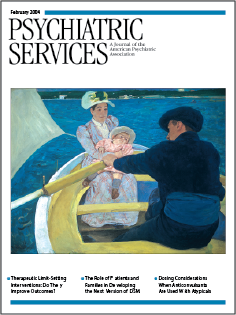A single Funding Source for Public-Sector Care
To the Editor: In the Taking Issue commentary in the September issue of Psychiatric Services, William Hughes (1) observed that although the report of the President's New Freedom Commission on Mental Health endorsed state plans to coordinate services, it did not go far enough. I agree with Mr. Hughes' proposal of single-source funding of care for the severely mentally ill population. Ideally, the United States should have a nonprofit single-payer health care system, such as Medicare. However, given the current economic and political situation, I doubt that people my age—73 years—will see it during our lifetime. Thus we need to search for partial solutions, particularly at the state level of government.
Several months ago Michael Hogan, Ph.D., who was chair of the New Freedom Commission and who is director of the Ohio Department of Mental Health, gave a most interesting lecture at Akron General Hospital on the background of the commission and the nature of its findings. He made several important points. First, the Bush Administration made it quite clear that the report must be "budget neutral," which seems to guarantee that the outcome of the report will amount to little more than rearranging the deck chairs on the Titanic. Dr. Hogan further noted that in light of the requirement for "no new money," the only substantive practical recommendation that the commission could make to raise more funds for direct care was the elimination of disability payments as we now know them for people with severe mental illness, and particularly for those with dual diagnoses. In other words, we should stop paying people for being mentally ill, although we should continue to maintain their health care benefits.
The only note of hope that Dr. Hogan injected was that the report would be passed along to the U.S. Public Health Service and the National Institute on Mental Health and that maybe these organizations would find ways to "adjust" some of their current programs in the direction of the commission's recommendations without incurring further expense.
So what can be done now? One approach may be to focus on change at the state level, which, because of current economic conditions and national priorities, may be the only level at which informed citizens can take meaningful action. I challenge the American Psychiatric Association, the National Alliance for the Mentally Ill, and the readers of Psychiatric Services to bring pressure to bear to abolish the irrelevant "pass through" regional and community mental health boards—including the Ohio boards—that provide no direct care themselves, do not effectively monitor the quality of care, and fritter away precious treatment resources on administrative costs—a sort of welfare program for some mental health administrators. (These remarks do not apply to mental retardation boards, many of which, at least in Ohio, do provide direct care and assertive case management teams for residents and clients.)
We should return the funds given to these boards to the state mental health agencies, which can then purchase more assertive community and residential treatment for the thousands of people with severe mental illness who now languish in jails or who wander the streets for lack of appropriate care.
Dr. Kuehn is clinical professor of psychiatry at Northeastern Ohio Universities College of Medicine in Rootstown, Ohio.
1. Hughes W: Unified funding: New Freedom Commission's only hope. Psychiatric Services 54:1189, 2003Link, Google Scholar



